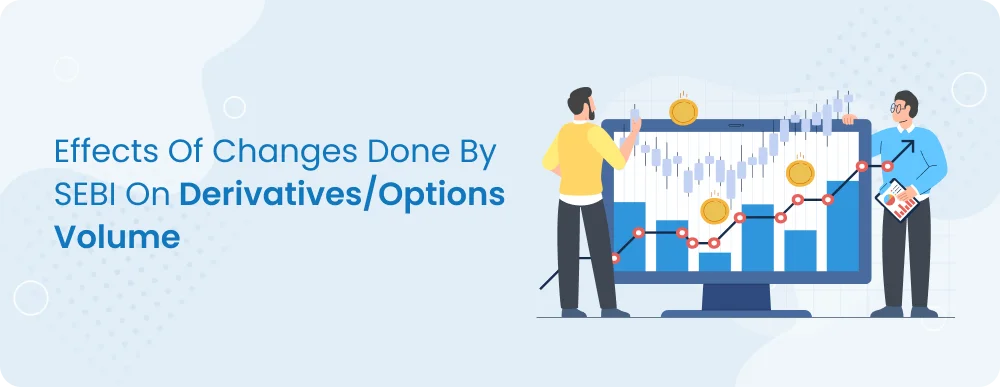Effects of changes done by SEBI on derivatives / options volume
Noor Kaur
24 Jan 2025Tags:
Featured
The recent SEBI changes in the derivatives market, including increased contract sizes and upfront premium collections, have significantly reshaped derivatives trading dynamics. These SEBI rules aim to promote better risk management and curb speculative trading.
However, they have notably impacted options and overall derivatives volume, particularly among retail traders facing higher capital requirements. Keep reading to know more!
Overview of SEBI
The Securities and Exchange Board of India (SEBI) is the regulatory body overseeing the securities markets in India. Established in 1988 and given statutory powers in 1992, its primary role is to safeguard investors' interests, promote the development of the securities market, and regulate its functioning.
SEBI's Recent Changes
The Securities and Exchange Board of India (SEBI) has introduced a series of significant regulatory updates to the derivatives trading framework, aiming to address speculative activity and improve market stability. These changes, effective from November 20, 2024, include:
Increased Contract Size
SEBI has increased the minimum contract size for index derivatives. This change is expected to curb excessive participation from retail investors, making derivatives trading less accessible for small-scale participants. The move is intended to reduce speculative risks but may lead to lower participation in sebi derivatives.
Reduced Weekly Expiries
Weekly expiries have been rationalised to one per exchange. For instance, NIFTY expiries occur only on Thursdays, while SENSEX expiries are held on Fridays. This has led to a significant drop in the number of contracts traded. For example, the NSE reported a 38% decline in index option contracts in the first week of December 2024.
Stable Premium Turnover Despite Reduced Notional Volume
Although options volume saw a sharp decline in notional turnover—NSE’s average daily trading value (ADTV) for index options dropped by 42% in December—the premium turnover remained steady. This indicates a shift towards trading higher-value contracts, aligning with the intent of SEBI rules to discourage high-frequency speculative trades.
Increased Tail Risk Coverage
Short positions on expiry days now require a higher margin (extreme loss margin or ELM) to manage volatility. This ensures market stability but raises the cost of derivatives trading for participants.
Shift to Monthly Contracts
With the discontinuation of weekly contracts for certain indices like BANK NIFTY and FIN NIFTY, trading volumes have shifted to monthly and benchmark contracts. While the daily premium turnover for these monthly contracts has surged, it hasn’t entirely offset the loss from weekly volumes.
Impact on Derivatives/Options Volume
SEBI's recent regulatory changes have significantly impacted India's derivatives and options volumes. Key adjustments include increased contract sizes for index derivatives, rationalisation of weekly expiry products, and higher risk margins on expiry days.
These changes have led to a noticeable decline in notional turnover and the number of contracts traded. For example, in December 2024, index options' average daily trading value (ADTV) fell by 42% at NSE and 22% at BSE compared to the previous month.
Implications for Traders and Brokers
SEBI's new regulations have several key implications for both traders and brokers.
For Traders
For traders, the increase in contract sizes and reduced weekly expiries will likely lead to lower liquidity in the derivatives trading market, potentially making it harder to enter or exit positions quickly.
The higher extreme loss margins (ELM) on expiry days also mean that traders must maintain larger margins for their positions, increasing the cost of trading. Retail traders, in particular, could feel the impact of reduced options volume as the market adjusts to these new conditions.
For Brokers
These changes may result in lower broker trading volumes, affecting commission earnings. However, brokers might benefit from the shift toward larger contract sizes as the overall value of trades increases, even though the number of trades may decline. Brokers must also update their systems to accommodate the new SEBI rules, ensuring compliance with margin and position monitoring regulations.
Long-term Effects on the Market
While the immediate impact includes reduced derivatives volume and lower speculative activity, analysts suggest these SEBI changes could strengthen the market’s foundation. The measures aim to create a more balanced trading environment by focusing on investor protection and reducing speculative trading.
These updates may increase participation from informed traders and institutional investors. However, as new trading regulations roll out, their full impact on market dynamics will become clearer in the coming months.
Conclusion
While SEBI’s trading regulations strive to create a more stable and transparent market, they have reduced participation from smaller traders in SEBI derivatives and SEBI options trading. These adjustments highlight the ongoing balance between fostering market stability and maintaining inclusivity in derivatives trading.
Noor Kaur
24 Jan 2025Related blogs
Sign up to our newsletter !
Share this article on
Recent articles
Tags:
Open a Demat Account in just 15 minutes !

Click on open
account below

Fill out some
basic details

Upload your
documents

Start trading in
24 Hours *
Commonly asked questions
Is Master Capital Services Limited SEBI registered?
Do you have a mobile app for Trading and Finance Management?
What services does mastertrust provide?
What is the minimum investment required to start trading with your company?
Is my personal and financial information secure with your company?
What is your customer support availability?





